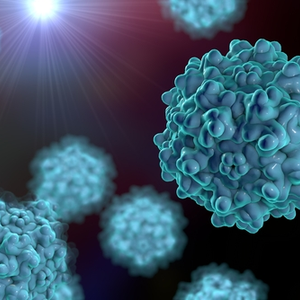
Adenoviruses are a group of pathogens that cause a variety of diseases, including those of the respiratory tract, gastrointestinal tract or the conjunctiva and cornea.
The viruses are highly contagious and resistant.
Adenoviruses are transmitted via droplet infection as well as faecal-oral. Since adenoviruses are difficult to inactivate with disinfectants, there is always a risk of nosocomial infection.
The incubation period is five to eight days.
371 kHz -387 kHz: Adenovirus:
Infectivity category: category 3.
The adenovirus causes:
- Respiratory infections
- Eye infections (such as macular degeneration - a disease that is the main cause of blindness in old age; retinal peeling, disturbed aqueous humour exchange)
- Adenitis and urinary tract infections
Infection can persist in the body in a latent form for a long time. The excretions of infected persons are contagious.
31 human viruses and 17 known viruses that occur in animals but also threaten humans can attack every organ in the body.
Adenoviruses often cause:
- Bronchitis
- Pneumonia
- Gastrointestinal diseases
- Cystitis
The latency is 3-9 days.
Common resonances:
393-394
393 kHz - 394 kHz: Adenovirus:
see 371-387
